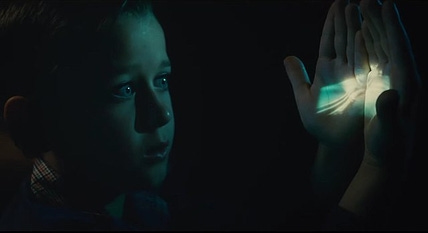Portrait of the Artist as a Young Mensch
In 'The Fabelmans,' Steven Spielberg gives us a picture of how families make artists

In a recent interview with Howard Stern on Sirius Radio, Bruce Springsteen noted that he and many of his successful peers were products of a particular family dynamic: unstintingly supportive mothers and remote, disapproving fathers. (This pattern is also vividly on display in the book I just finished reading: Dave Itzkoff’s absorbing 2018 biography of Robin Williams.) With The Fabelmans, Steven Spielberg makes clear that he too is a product of this family tradition, which he documents in a lovingly intricate family portrait.
As a number of stories have indicated, including this piece in the New York Times, much of The Fabelmans is autobiographical, and it’s clear that whatever variance there may be in the details, much of the story rests on confirmable fact, including the key plot point, which I won’t reveal here. Like the characters in the story, which follows the young Sammy Fabelman (first played by Mateo Zoryan, and then by Gabriel LaBelle) from childhood into young adulthood, Steven Spielberg spent part of his itinerant childhood in New Jersey, moved to Arizona, and ended up in California. His mother was a frustrated concert pianist; his father was a computer engineer. He had three sisters. And he really did have an epiphany while watching Cecil B. DeMille’s epic 1952 film The Greatest Show on Earth. Even small plot details like the arrival of a monkey as a family pet actually happened. One shouldn’t exaggerate the film’s factual fidelity—liberties were taken throughout—and keep in mind that what we see here is essentially one point of view (and a child, at that). But the spirit of the story seems deeply true.
Spielberg is once again collaborating with screenwriter Tony Kushner, with whom he also made Munich (2005), Lincoln (2012), and West Side Story (2021). Kushner seems to specialize in zeroing in on particular aspects of well-known stories — with Lincoln, what began as an adaptation of Doris Kearns Goodwin’s Team of Rivals was distilled into a small episode of the Lincoln administration’s effort to get the enabling legislation for the 13th Amendment through Congress in early 1865—and here we witness the emergence of a great filmmaker against the backdrop of his parents’ disintegrating marriage. What’s notable here is how exceptionally fair-minded the portrayal of the characters seems. As seems easy to do, we sympathize with his mother’s thwarted artistic ambitions (a task made even easier by Michelle William’s typically brilliant performance). Paul Dano, who has most memorably played deeply unsympathetic, twisted figures in There Will Be Blood and 12 Years a Slave, comes off as a gifted yet hapless character who can only appreciate his son’s burgeoning talent in terms of engineering and angers him by repeatedly referring to filmmaking as a “hobby.” The Fabelmans is a piece of self-conscious revisionism in that in real life, Arnold Spielberg falsely took the blame for his parents’ failed marriage because he believed doing so would be easier on his children. Even the presumable snake in the garden, played by Seth Rogen, really isn’t a bad guy, even if young Sammy thinks he is.
The other half of The Fabelmans is about Sammy’s emergence as an artist, and here Spielberg—to a degree rivaled only by his peer Martin Scorsese—excels at telling stories with pictures. There’s an indelible image, reproduced above, of a child projecting a home movie onto his hands, a gorgeous metaphor for film directing. We witness Spielberg’s sheer genius as a child, an inventiveness that’s a source of wonder for all who witness it on the screen and in the audience. There’s some wonderful meta-textuality about this, as when, in a deeply comic moment, young Sammy agrees to keep a classmate’s secret—unless of course he someday makes a movie about it. And there’s also a scene where Spielberg meets his childhood idol, the cantankerous John Ford, played with aplomb by director David Lynch. As Springsteen has said, and which certainly applies when it comes to Ford (Easter Eggs abound, among them the theme from The Searchers), trust the art, not the artist.
Among other things, The Fabelmans—at two and a half hours a bit long and yet a gallery of images worth savoring, among them Mitzi Fabelman’s red nail polish—functions as a social document of the postwar era. Spielberg captures much of this in its sense of shimmering possibility (he went to high school in the early sixties, captured with Beach Boys exuberance), but he also documents its dark side in the anti-Semitism that shadows his life, sometimes as a vague sense of (occasionally amusing) outsidership and then in some real menace. He is firm in showing this for what it is, even as, here, too, there is generosity for human foibles. Spielberg is sometimes accused of sentimentality, but that charge can’t really stick to a man who made Schindler’s List or Saving Private Ryan (though I will confess to some impatience with the way he sometimes underlines dramatic moments with unnecessary music). His life is an American Dream come true. Which may explain—though, given the complexities of the human heart, not entirely—the benign spirit that animates his artistry. We would all be lucky to share it.
Looking for a stocking stuffer? Check out my new book 1980: America’s Pivotal Year.



Heading over to Jacob Burns to see this asap!